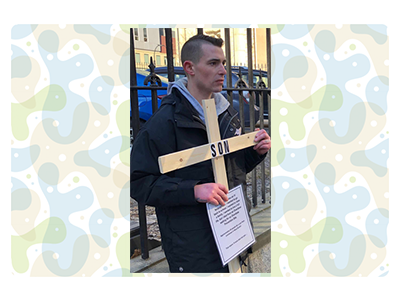Can Halifax open Atlantic Canada’s first legal overdose prevention site?

“Chasing the new is dangerous to society.” I read this quote at an activist art exhibition and it got me thinking about Halifax, my city, and of the group that I belong to. What if the old way of healthcare is actually dangerous to society at a whole?
In Nova Scotia, 56 people died from overdoses in 2018. Estimates from 2017 reported 295 new diagnoses of hepatitis C and 15 new cases of HIV among Nova Scotians. In 2018, the number of new HIV cases reached 29 by the end of the year, primarily among injection drug users in the north end of Halifax. I’m a survivor of the opioid epidemic and the president of HaliFIX Overdose Prevention Society. Our mission is to legally operate an overdose prevention site (OPS) in the city.
We need to be continuously thinking outside of the box to curb this opioid epidemic, the HIV and hepatitis C crisis and the criminalization of drug use, a healthcare issue that is costing us a lot of money. Where I’m from, the HIV outbreak is very real. And things could always get worse. 44 percent of people living with hepatitis C are unaware they have it, so Halifax could have an increase of undiagnosed cases of hepatitis C. And one preventable overdose is one too many.
The beginning stages
We now have a lot of evidence-based research that shows that OPS reduce the transmission of blood-borne pathogens, reduce injection-related infections such as endocarditis, reduce overdose fatalities and increase referrals to health and social services, such as detox and housing supports. So why the hesitation from the provincial government? I can’t answer that question, but I can give you some background on our process of trying to implement Atlantic Canada’s first OPS.
The idea of having a safer consumption site in Halifax actually started several years ago before I got involved. Diane Bailey, director of the Mainline Needle Exchange Program, and Cindy MacIsaac, executive director of Direction 180, had been discussing it with Nova Scotia’s chief medical officer of health. Meanwhile, San Patten, a health researcher and evaluation consultant, had been looking into existing models of needle distribution programs and safe consumption in Nova Scotia.
In the beginning stages, meetings were held with pro-bono law students, allied health professionals, researchers and members of the community to flesh out what a safer consumption service would look like. Would it be run out of Direction 180, Halifax’s low-barrier threshold opioid treatment program? Would it get provincial support?
The ups and downs
I remember getting really fired up at one community consultation held by Mainline and Direction 180 where there were many supporters and some opposers. I did a media interview that day about the urgent need for this life-saving service from the perspective of a former injection drug user. Shortly after, I became involved with the working group and I hit the ground running.
There have been a lot of ups and downs in the process of trying to implement an OPS. We have come so close to getting the thumbs up from the policy makers, only to have more roadblocks pop up. Sometimes we get asked: Why North End Halifax? Why not Dartmouth, Fairview or Spryfield? Well, we’d love to have OPS in those areas as well, but we have to start somewhere.
And North End Halifax seems to have the right services in place to be the starting point. It has over 200 shelter beds and over 300 supportive housing units. And it is home to several harm reduction organizations like the Mainline Needle Exchange Program, the Mobile Outreach Street Health and Direction 180, not to mention various other ancillary support services.
Logistical nightmares
In December 2018, when the federal government announced they would provide legal exemptions for OPS in communities that did not have provincial support, Direction 180 began looking into submitting an application, but they quickly discovered that they couldn’t finance the operation of an OPS. And even if they could, it might impact their funding.
So, with the help of key informants, we submitted a briefing note to Nova Scotia’s minister of health, asking again for support. However, we were unsuccessful, and were advised that the province would not support the OPS without a policy change at the provincial level.
Members of Direction 180 and HaliFIX have made numerous requests to meet with the health minister to further discuss the issue, but we haven’t received a response to date. With limited funding for the already existing harm reduction services in place, we were all in shock and did not know how to move the OPS project forward with only federal government support.
As these logistical nightmares were happening, I continued my work and outreach and decided to travel to the Downtown East Side of Vancouver to witness firsthand what it takes to run an OPS. I’m not about to stop now. HaliFIX Overdose Prevention Society will continue to fight for a legal site in the north end of Halifax. Our most vulnerable people need this service. And we need to save lives.
To be continued.
Matthew Bonn is the president of HaliFIX Overdose Prevention Society and a member of Halifax Area Network of Drug Using People (HANDUP) and Peers Assisting and Lending Support (PALS). He is also an outreach worker for Mainline Needle Exchange and Hepatitis Outreach Society of NS (HepNS).

This is the right website for everyone who would like to understand this
topic. You understand a whole lot its almost hard to argue with you (not that
I actually would want to…HaHa). You definitely put a brand new spin on a subject that’s
been written about for years. Excellent stuff, just
excellent!